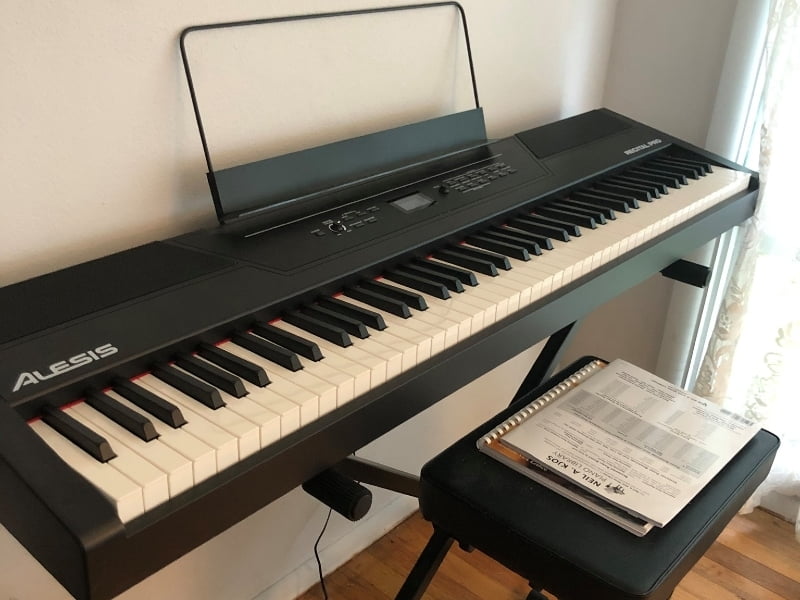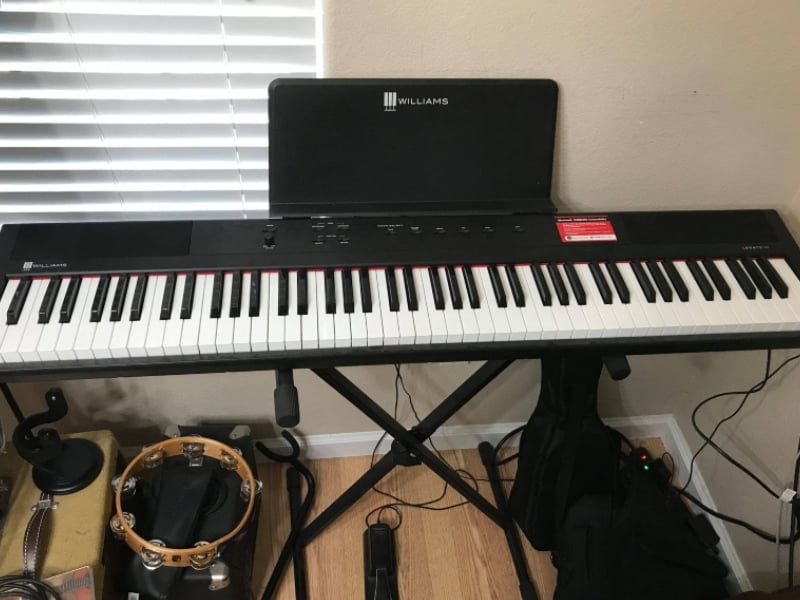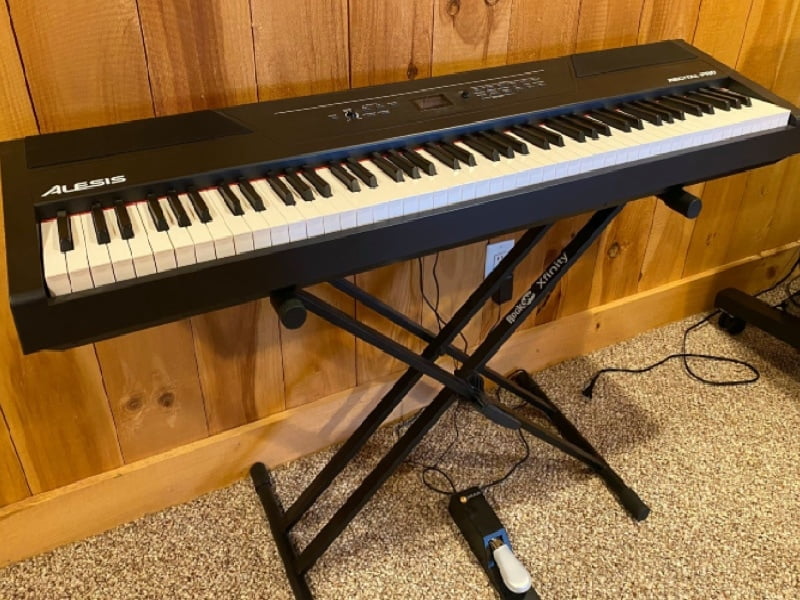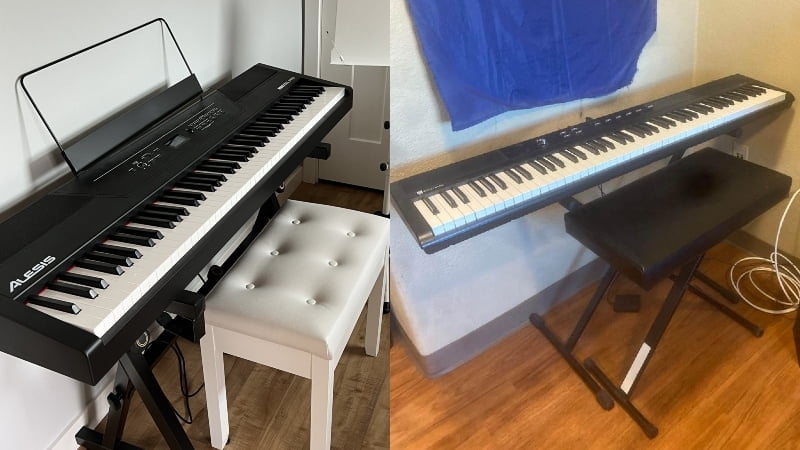In this Alesis Recital Pro vs Williams Legato III review, we’ll get into the pros and cons of both models to help you find the best piano for your needs!
The Alesis Recital Pro is one of my favorite budget-friendly digital pianos. It’s very affordable but comes with features that you would expect from more expensive pianos. So, if you’re looking for your first digital piano, there aren’t many models that come close to the functionality of this piano.
That said, there is one piano that’s been making waves recently in the same range: the Williams Legato III. And when I tested this piano, I found a lot of good features. However, after thorough testing, I found that it still couldn’t compete with the Alesis Recital Pro.
Some pianists may prefer the Williams model, but if you want the most value for the money, I would recommend the Recital Pro. In this article, I’ll dive into all the reasons why I chose the Alesis in this Alesis Recital Pro vs Williams Legato III review.
I’ll explain all the features I tested and exactly how the Recital Pro won out. And by the end, you’ll know exactly which model would be the best fit for your needs.
Alesis Recital Pro vs Williams Legato III: Comparison Chart


Last update on 2025-04-14 / Affiliate links / Images from Amazon Product Advertising API
Alesis Recital Pro vs Williams Legato III: A Head-to-Head Comparison
I tested the feel, tone, and piano features of both instruments to find the winner. I did a lot of tests and research, and by the end, the score was 3-0 in favor of the Alesis. The Williams Legato III put up a good fight in some categories, but it still couldn’t compete with the Alesis Recital Pro.
In this section, I’ll explain exactly how I tested the pianos and how I felt about them. That way, you get the full picture, which is very important when finding a digital piano to use on your musical journey.
Feel & Playability
The winner: Alesis Recital Pro
If your digital piano doesn’t feel like an acoustic piano, you may run into some trouble. That’s why the first phase of testing these pianos involved checking the feel. I played both of the pianos for a couple of minutes to gauge the weight and key texture of the instruments. And as I guessed, the Alesis Recital Pro’s fully weighed keys easily beat out the Williams Legato III.
+Hammer Action
If you want a piano that can replicate how it feels to play an acoustic piano, the Alesis Recital Pro is the right option for you. This piano comes with fully-weighted keys. So, you will feel just the right amount of resistance whenever you press a key.
My only complaint with the Alesis Recital Pro’s hammer action was that all the keys had a fairly uniform weight. While it isn’t a major issue, this isn’t how an acoustic piano is a setup. When you plan an acoustic piano, you’ll notice that the lower keys are a bit heavier than, the higher keys, and it would have been nice to have this feature on the Recital Pro.
While I had one complaint about the Alesis Recital Pro’s hammer action, there was no doubt that it was better than the Legato III. This is because the Williams Legato III only has touch-sensitive keys. This means that you can tweak the volume and strength of the note by adjusting how hard you push the keys.
However, playing this piano felt closer to an electric synth than an acoustic piano. There are some pianists that enjoy the non-weighted keys, but if you’re looking for realism, the Williams Legato III might not have what you need.

Tone
The winner: Alesis Recital Pro
After judging how the pianos felt, it was time to test how they sounded. Between the two, the Alesis Recital Pro sounded much better because of the sound system. And even when I plugged the pianos into the same speaker, I noticed more detail in the Alesis’ voices.
On top of that, the Recital Pro comes with more voices than the Williams Legato III. So, not only did it win in terms of tonal quality, but it beat out the Legato III with its tonal variety as well.
+Tone Generation
As far as I can tell, both pianos used sampling to create their sounds. This means that each piano is loaded with a set of recordings. And whenever you press a key, you trigger these recordings and produce a sound.
Both of these pianos do a good job of replicating the tones of other instruments. However, the samples on the Alesis are slightly better than the Williams. So, you can expect more realistic and detailed sounds when playing the Alesis Recital Pro.
The Alesis Recital Pro is a bit better if you’re particular about tonal quality. That said, these are still entry-level pianos, so it would be unfair to expect them to replicate the sound of other instruments perfectly.
+Sound Library
Another reason the Alesis Recital Pro ended up taking the point in this category was the sound library. The Williams Legato III only has 10 different voices, while the Alesis has 12. Granted, this doesn’t sound like that big of a difference, but if you want the piano to sound exactly how you want it, the extra two options on the Recital Pro are a huge deal.
Both pianos come with all the essential tones like an acoustic piano, electric piano, synth, and organ voices. The only difference with the Recital Pro is that you get additional options for your acoustic piano sounds.

Piano Features
The winner: Alesis Recital Pro
The last comparison point I had was the piano features. The Alesis Recital Pro easily won out again because it came with more playing modes and had a great maximum polyphony. This is another testament to the versatility of the Recital Pro and another reason I find it to be one of the best digital pianos in this price range.
+Playing Modes
The Alesis Recital Pro has dual and duo modes. These are great for beginners and make for a very versatile piano. You can blend different voices together with dual-mode to create a unique sound. With duo mode, you divide the piano into two mini pianos that have the exact same tuning.
The duo mode is great for both piano lessons and for piano duets. As a beginner, these are probably two of the most useful playing modes to have.
On the other hand, the Williams Legato III doesn’t come with any additional playing modes. And even if additional playing modes aren’t necessary for beginners, it still would have been nice to have them on the Legato III.

+Polyphony
The Williams Legato III only has a maximum polyphony of 32. And while this should be enough for most beginners, it limits the amount of expression and notes you can play simultaneously. The Alesis Recital Pro completely solves this issue with 128-note maximum polyphony, which would be sufficient for even a professional pianist.
Alesis Recital Pro vs Williams Legato III: The Similarities
Most of the similarities between these two pianos are surface level. These are both portable digital pianos with similar designs and have a similar control panel. Even if the Alesis Recital Pro has a display, switching between voices and modes is about the same on both pianos.
Both of these pianos are easy to bring around, affordable and have the full range of the piano. And while I prefer the Alesis Recital Pro, both options would make a decent digital piano for any beginner.
Quick Rundown of the Alesis Recital Pro
- A Digital Piano That’s Tailored to You - Feature-packed electric keyboard with 88 premium full-sized weighted hammer action keys with adjustable touch response to suit your preferred playing style
- Premium Sounds - 12 voices (Incl. Acoustic Piano, Electric Piano, Organ, Synth, and Bass), built-in FX: Chorus, Modulation, Reverb, and two built in 20W speakers for clear, room-filling sound
- All The Right Connections - ¼” sustain pedal input (pedal not included), ¼” stereo headphone output for private practice and stereo outputs for connection to speakers / amplifiers
- Play the Keyboard Wherever You Go - Power via the included power adapter or 6 D cell batteries (not included) for professional piano performance anywhere
- Powerful Educational Features - Standard, split, layer, record and lesson modes with 128-note max polyphony and Skoove 3 month premium subscription for expert interactive online piano lessons
Last update on 2025-04-14 / Affiliate links / Images from Amazon Product Advertising API
Quick Rundown of the Williams Legato III
No products found.
Product Videos
References:
- Alesis Recital Pro: https://www.alesis.com/products/view/recital-pro
- Williams Legato III: https://williamspianos.com/legato-iii/
Lulacruza is an electronic folk duo operating at the junction of the hypermodern and the ancient. Our music weaves together hypnotic female singing, South American folk instruments and electronic processing, while channeling pulsating waves from the source of creation.
Lalucruza is also a community where you can connect with other music lovers to collaborate, exchange ideas and share knowledge. A platform for who wants to learns the basics of playing piano, guitar, drum masters’ technique, etc.. is the premise of our website.
